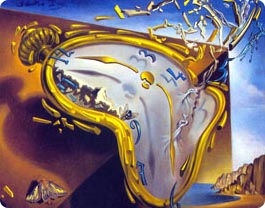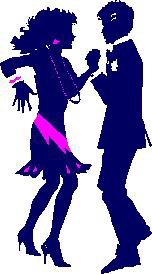|
That weekend, I bought a cake of
reddish-brown pancake makeup from the neighborhood drugstore. In
front of the bathroom  mirror,
I wet a little white sponge, saturated it with the cream, and covered
my face, neck, hands, and arms with it. In contrast to my now bronze
skin, the light brown eyes that looked back at me had a leonine
look, like the yellow-amber eyes in the faces of some Jamaican
people I had seen. I tied a colorful paisley scarf around my head
to hide my hair. When I emerged from the bathroom and showed myself
to Armand, he smiled a crooked smile of ironic appreciation, just
one side of his lips turning up. With Armand, the more bizarre
things were, the better. His favorite artists were Salvador Dali,
Magritte and de Chirico. My getting myself up like this, blurring
the lines between art and life, was the closest gift to a melting
clock or a levitating hat that I could give him. I also hoped he
found my gesture flattering. mirror,
I wet a little white sponge, saturated it with the cream, and covered
my face, neck, hands, and arms with it. In contrast to my now bronze
skin, the light brown eyes that looked back at me had a leonine
look, like the yellow-amber eyes in the faces of some Jamaican
people I had seen. I tied a colorful paisley scarf around my head
to hide my hair. When I emerged from the bathroom and showed myself
to Armand, he smiled a crooked smile of ironic appreciation, just
one side of his lips turning up. With Armand, the more bizarre
things were, the better. His favorite artists were Salvador Dali,
Magritte and de Chirico. My getting myself up like this, blurring
the lines between art and life, was the closest gift to a melting
clock or a levitating hat that I could give him. I also hoped he
found my gesture flattering.
"I have to take you out looking like that," he said.
We walked outside, down the street and got on the subway; I was
thrilled to be seen with him. In a way, it was a relief not to
have people stare at us as an interracial couple. Now they just
stared at us as a matching pair of outcasts. I caught the eyes
of both Black and white people looking at me. I was especially
interested in the reactions of the Black people. I couldn't tell
if they thought I was one of them, or saw through my disguise and
considered me a crazy lady. Not knowing if they knew was tantalizing
in itself. Struck by the sheer playfulness and theatricality of
it all, I felt my laughter stream out like a glittering silk ribbon.
I could tell Armand was trying to keep a deadpan face, but his
eyes were dancing with amusement.
 I couldn't help thinking that I'd like to see the rest of
him dance. He stood there looking so proper and stiff. For both
of us, it was a grand game, but Armand was careful to protect his
role of dignified observer. I couldn't help thinking that I'd like to see the rest of
him dance. He stood there looking so proper and stiff. For both
of us, it was a grand game, but Armand was careful to protect his
role of dignified observer.
Later that week, I borrowed a small radio from my parents' house.
I was listening to it in our room and started dancing to the music
while Armand stood by the window watching.
They were playing "Sittin' On The Dock Of The Bay," a song
we both liked a lot, but which Armand usually listened to with
rapturous attention--his eyes turned upward, glistening with joy,
like the eyes of someone in an early Italian Renaissance painting.
 This time, his eyes were on me. This time, his eyes were on me.
"Hey, Armand!" I called. "Do you dance? "
"No!" he answered.
Suddenly, he was a man painted into a corner and stood there with
his shoes glued to the floor. I found it hard to hide my surprise.
"What's the matter?" Armand called from the corner.
"Nothing."
"You look disappointed."
I turned the music lower, so we could hear each other.
"I'm just sorry I can't share the joy of dancing with you."
He frowned so that his eyebrows met in the middle of his forehead.
"I gotta have a good sense of rhythm because I'm Black?"
"No."
He looked at me with torpedo eyes.
"C'mon. That's what you're thinking, isn't it? "
I tried to look casual and tossed my head so that my hair swung
back.
"Well, I am a little surprised."
"Yeah. You want me to tap my feet and shake my hips? Is that
how you see me?"
He performed the movements he was describing with ridiculous awkwardness
as he spoke. If he was clowning, I was too confused to laugh.
"No, Armand. I know you're more the serious type. You like
to have fun in other ways."
"Yeah? Like what?"
All I could think of was how he had stuck his tongue out from
the side of his mouth and started panting the day before, when
he told me a joke about masturbating.
You think because I'm Black, I must be
sexually obsessed? I could hear him say in my mind.
"No, it's me," I said aloud.
"What are you talking about, Millie?"
"It's me who has a good sense of rhythm. Don't you think
so?"
I did a two-step, lifted an arm above my head, and twirled myself
around.
He managed to smile--not one of his more radiant smiles, but one
that was warm enough to send tingles up and down my spine, as if
he were playing arpeggios there with his fingers.
"I could teach you to dance, if you want," I said, rolling my
hips invitingly to the music in the background..
He shook his head no.
In that moment, I saw my romantic dreams of slow-dancing in his
arms to Frank Sinatra swoosh down the drain like dirty dish water.
Armand was my lover. If I couldn't dance with him, would I never
have a partner again? I pictured us at a party together. I was
serving hors d' oeuvres, sitting out
all the dances, or standing with stoic loyalty at his side, while
other couples, who had caught the beat, were gyrating around us
in an ecstasy of love.
"What a party!" I said aloud.
"Say, what?"
"What about a party? To celebrate our new home." I had accidentally
hit the right note to bring us back into harmony again. If we couldn't
dance together, we could share our love in other ways.
Armand cocked his head, as if he were listening to a catchy new
phrase riding on top of the melody emanating from the radio. He
took a step toward me--a plain walking step that was out of synch
with the beat.
"Hey, you know, Millie, that's not a half-bad idea."
"We can invite all our friends," I coaxed him.
He suggestively strode up to me with a rhythm all his own and
grabbed me around the waist. As the music soared again--at least
in my head--I wished he could have lifted me off the floor and
whirled me around. But instead, we held each other in a static
embrace, and I had to be satisfied with that.
Armand invited his friend James, who brought along
some other friends, and we asked a few people we had just met in
the neighborhood, who also brought friends. We bought pretzels
and potato chips, wine, scotch and vodka. Peter and Patricia let
us use their kitchen, and at eight o' clock on Saturday, people
began to pour through the door. We put everyone's coats in our
bedroom. 
In the midst of the socializing all around us, Armand introduced
me to James and his friends, but all I could see was a group of
Black men.
"Armand told me all about you," James said warmly.
I wondered how much he had told and blushed at the idea of being
talked about, but couldn't think of what to say in reply." Armand
told me all about you, too?" I didn't think he had,
or if he did, I couldn t remember.
Most of the night was a blur of moving though a crowd of people
I barely knew or didn't recognize, but who seemed to be having
a good time and feeling more at home in my home than I did--and
who drank up all our liquor. Nobody was dancing. It was just a
drinking party. I felt I was outside a window, looking in at a
party in someone else's house. I didn't even press my nose
against the glass. I had no wish to go inside.
Late in the evening, Armand and I escaped to our bedroom but,
to our surprise, found the bed occupied by a diminutive, amber-skinned
Black girl in a lavender dress, who was apparently asleep. Her
arms and legs were so delicate, that when she opened her big amber
eyes, she looked like a fawn.
"Oh!" she said, coming fully awake at our entry.
"Hi," Armand said. "What's your name?"
"Inez," she answered.
"Are you all right?" I asked.
"I'm fine," she said, yawning. "I came in here to get my
shawl but just thought I'd sit on the bed for a minute. I must
have fallen asleep."
She was like somebody from a fairy tale, and I couldn't help
staring at her in wonder. On the other side of the bed, I saw Armand
looking at her tenderly through his glasses, half like a solicitous
doctor and half like an appreciative wolf observing a dainty morsel.
She returned our gazes with an innocent, inquiring look of her
own, and the air was charged with possibility as the three of us
vibrated to the same wavelength.
Then James' voice called from the doorway, "So that's where
you are, for God's sake!" and added, "I hope I'm not interrupting
anything."
People came in to get their coats and take their leave, thanking
us for our hospitality, and the fawn-like creature who was Inez
was drawn away by the flood of urgently moving bodies.
"What happened to Inez?" I asked Armand, when we were finally
alone and our room echoed with an uncanny emptiness.
"She vanished."
"How? Where?"
He shrugged and yawned. "She fell through the cracks."
Then he slipped his hand under my skirt and slid it up my thigh.
"C'mon," he whispered in my ear. "It's time to go to bed.
We can do without her."
***
In the next issue, their relationship is tested when Millie,
shocked and saddened to learn about the death of an old friend, turns
to Armand for comfort.

|
